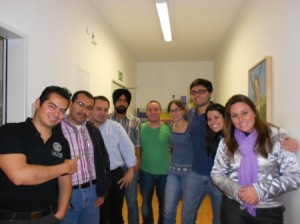Don’t be scared Luiz! This Dative and Akkusative stuff also drives me crazy!!! When you final think that you understood…Surpriiiiiise! But you didn’t. Luckly we have good friends in the class that can help us to understand a bit better (right Filippo and Mihal??). Let’s see if I learned:
Ich lerne in dem Arbeitszimmer
Gestern war ich in dem Kino
Das buck liegt in dem Scharank. Lege es auf den Tisch.
Unsere Wohnung hat keinen Balkon, aber einen Garten.
Ist das richtig?!!
See ya,
Gabi










